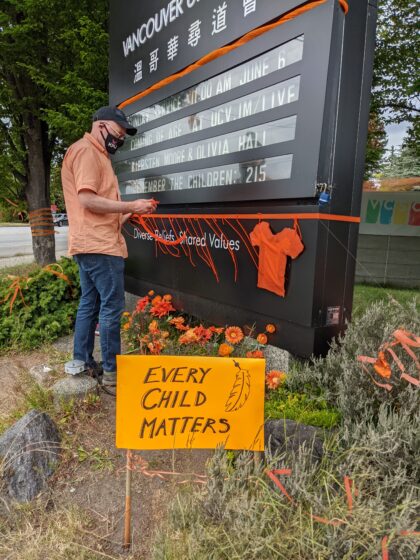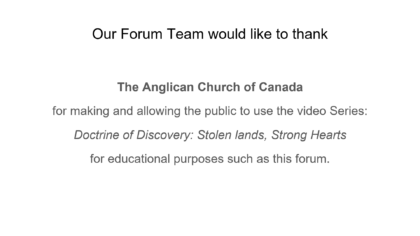 Thirty people helped to create an orange installation on our corner and magically (with hard work) transform a labyrinth full of buttercup weeds into a bright orange spectacle.
Thirty people helped to create an orange installation on our corner and magically (with hard work) transform a labyrinth full of buttercup weeds into a bright orange spectacle.
Throughout June, Indigenous Peoples Month, we expect to host more gatherings to make sure both sites remain beautiful and invite our neighbours and our own community to come and participate.
49th and Oak Corner
With the terrible news about the abused and murdered children buried in a mass grave at the Kamloops residential school, I wanted to do something at UCV to acknowledge the pain and reflect our growing awareness and demands for change. The UCV community had already agreed to donate money to the IRSSS (Indigenous Residential School Survivors Society), but I wanted to also put on a public face to remind others not in our community that we ALL need to care and remember.
What started out as an idea to put a few children’s toys by the trees, grew into an act of community solidarity and art.
On Saturday June 5, while volunteers planted 215 marigolds into the labyrinth, about a dozen adults and children braved the traffic noise at the corner of Oak and 49th to cover the UCV sign and nearby trees with orange ribbons, flowers, tshirt cutouts and signs. A project to attach 215 strands of wool to a clothes line was started as a visceral example of how large a number 215 is!
The rains came at night and the ribbons and signs are soggy. We will need to refresh the signs, add more wool strands (because 215 is only the start) and straighten the ribbons next week.
Perhaps this is the first time we’ve decorated our corner?! Let it not be the last.
-Tamiko Suzuki

Labyrinth
215 orange flowers on the labyrinth
This vision just popped into my head as I, like many, started thinking: but what can *I* do? There’s so much that can be done and I’m very proud to be part of UCV as we’ve made a statement and donated money.
I so appreciate the number of people who brought flowers, worked long and hard to prep the labyrinth (it was badly in need of weeding) and then planted the orange blooms. Plus there are 48 nasturtiums not yet in bloom. It will “orange-up” over the next while.
What moved me most was the number of side conversations I witnessed as we worked – and connected with each other over the time.
Thank you to our minister, Rev. Lara Cowtan, for beautiful and moving words and an ongoing pastoral presence.
(There are still a few buttercups and lots of grass where it shouldn’t be, so if you’re ever inclined to spend a couple of hours there, do please contact me and we can set something up.)
– Mary Bennett
UCV Actions
UCV President has made a statement and our Outreach Opportunities Fund have donated $3000 with more to come to Indigenous Residential School Survivors Society (IRSSS).
Message from the Outreach Opportunities Fund Committee.
A $3000 donation from the balance of the OOF account has been made by UCV, effective immediately, to support the work of the Indigenous Residential School Survivors Society (IRSSS).
In order to support the increased demand for their services, the IRSSS will also be the recipient of the OOF effective July 1.
As we all know, the impact of residential schools on the Indigenous population has been profound. The IRSSS was established with the mission to provide physical, emotional, intellectual, spiritual growth, development, and healing through culturally-based values and guiding principles to residential school survivors, their families, and those dealing with Intergenerational traumas.
– OOF Committee, June 2021




 Starting March 6 and running until June 2022, our next Outreach Opportunity Fund recipient will be the Wild Bird Trust of BC. WBT manages the Conservation Area at Maplewood Flats in North Vancouver. The Trust’s mission is to provide wild birds with sanctuary through ecological protection and restoration, and support communities with education, culture, and reconciliation programs. With 80,000 annual visitors, it features 5km of trails, a spectacular Nature House with year-round public artistic exhibitions, a social enterprise nursery, and wildlife education.
Starting March 6 and running until June 2022, our next Outreach Opportunity Fund recipient will be the Wild Bird Trust of BC. WBT manages the Conservation Area at Maplewood Flats in North Vancouver. The Trust’s mission is to provide wild birds with sanctuary through ecological protection and restoration, and support communities with education, culture, and reconciliation programs. With 80,000 annual visitors, it features 5km of trails, a spectacular Nature House with year-round public artistic exhibitions, a social enterprise nursery, and wildlife education. Why change the name now?
Why change the name now? Thirty people helped to create an orange installation on our corner and magically (with hard work) transform a labyrinth full of buttercup weeds into a bright orange spectacle.
Thirty people helped to create an orange installation on our corner and magically (with hard work) transform a labyrinth full of buttercup weeds into a bright orange spectacle.


You must be logged in to post a comment.